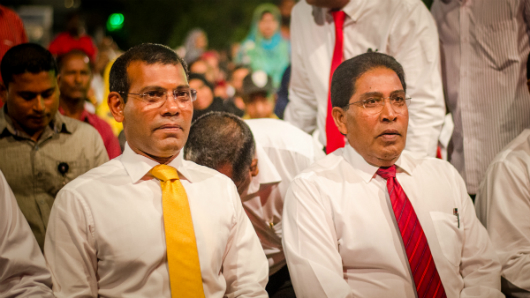Opposition leaders have attacked the leadership of President Abdulla Yameen as the Maldivian Democratic Party (MDP) and Jumhooree Party (JP) officially signed an agreement to defend the Constitution.
“It is becoming too apparent that President Yameen is headed towards establishing a dictatorial rule,” said former President Mohamed Nasheed at the signing ceremony in Malé’s carnival area on Thursday evening.
JP leader Gasim, meanwhile, railed against persistent attacks on his business interests as more reports emerged of setbacks to the Maamigili MP’s personal investments.
“President Maumoon [Abdul Gayoom] can laugh but tell me which part of the Constitution allows the state to seize people’s property and businesses unfairly and unjustly, without even compensation?”
Former President Gayoom last week suggested that talk of defending the country’s Constitution made him laugh, arguing that the current government has not violated the document.
The opposition has accused Yameen’s administration of breaching the Constitution, in particular through the removal of the auditor general and two Supreme Court judges late last year.
The live feed to Thursday’s ceremony- supplied by Gasim’s VTV – was cut prior to the event, with reports that the cable had been vandalised. The transmission was subsequently provided via the MDP-aligned Raajje TV.
Home Minister Umar Naseer has this afternoon (February 7) announced his decision to leave the JP as result of the party’s “new course”.
Gasim defiant
Former Yameen ally Gasim challenged his opponents to take his assets, suggesting the government had no legitimacy following the withdrawal from the Progressive Coalition.
“You were elected with my support. I can guarantee you that you will not receive 51 percent of Maldivian votes. Forget it.”
Gasim’s eventual support for the Progressive Party of Maldives (PPM) candidate Yameen – a decision his party said had been made democratically by its council at the time – tipped the balance in the much-delayed 2013 presidential poll.
The JP’s national council officially announced the end of its alliance with the PPM last month – in effect defunct since Gasim’s decision to stand for Majlis Speaker in May – handing its leader the authority to strike an alliance with the MDP.
The JP’s opposition to key government legislation last year saw Gasim receive setbacks to his businesses, as well as physical threats against his person – both of which the party blamed on Gasim’s former political allies.
“You can seize everything, take it. Take it. After all, things can only be taken from people who have them,” he told those at Thursday night’s rally.
“Yameen, do not think that a well-built man can come and shoot me with a gun. No, No, No. I am not afraid even one bit.”

Former President Nasheed also addressed those present – including senior representatives from both parties.
Nasheed reiterated suggestions that the repeated failure of governing coalitions demonstrated that a parliamentary system was required for the Maldives.
“The Maldivian people want a parliamentary system of governance, a system without a president who is too powerful, a system in which a coalition of political parties can govern,” said Nasheed.
In a 2007 referendum, approximately 62 percent of the public backed the presidential form of governance ahead of the country’s first multi-party elections.
At the time, both the MDP and President Yameen’s former party, the Progressive Alliance, supported the parliamentary system, while then President Gayoom supported a presidential system.
Nasheed’s own electoral coalition – which included Gasim’s JP – fell apart soon after his 2008 election, with the subsequent anti-government alliance forcing his resignation in February, 2012.
The agreement
Thursday night’s rally saw the distribution of the agreement, which pledges to “defend the spirit of the Constitution and do everything necessary to guarantee the rule of law”.
The agreement pledges to prevent the passing of any propositions in the People’s Majlis against the letter or the spirit of the Constitution, both inside and outside of the Majlis.
Together, the two parties control 34 seats in the 85-seat legislature, although MDP internal party discipline had been a decisive issue in recent votes – most notably in December’s vote to remove Chief Justice Ahmed Faiz and Justice Muthasim Adnan.
The agreement pledges that the parties will cooperate to hold the government accountable for Constitutional breaches, as well as working to defend those subjected to intimidation by the authorities.
Signatories to the agreement pledged to: “investigate and cooperate to bring an end to Government intimidation against the general public, journalists, state owned companies, employees, business leaders, youth, independent institutions, and politicians”.
To these ends, the parties agreed to form an Inter-Party Commission and a joint parliamentary committee within ten days,
Related to this story
Opposition alliance a “waste of time”, says Gayoom
MDP and JP reach agreement on defence of Constitution
Likes (4)Dislikes
(4)Dislikes (0)
(0) 
